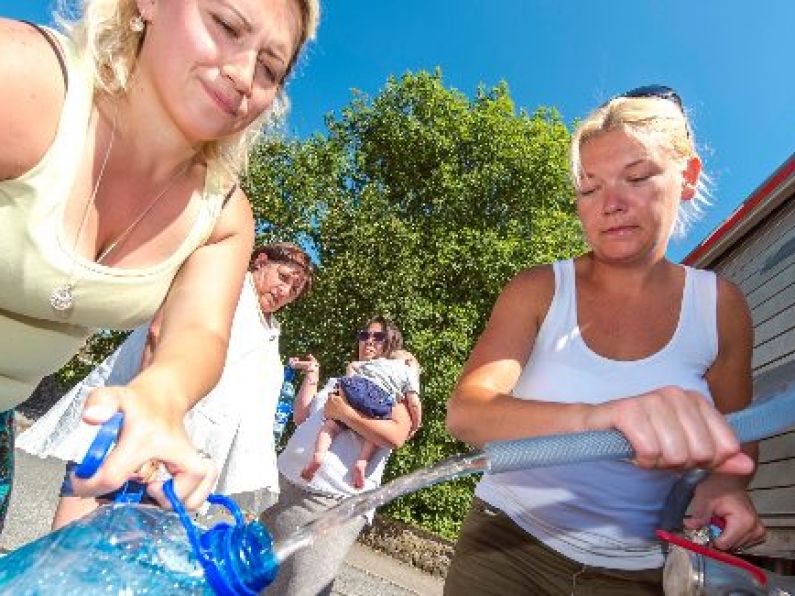By Joe Leogue
Households across the country are facing water restrictions and outages as the ongoing heatwave continues to put the water network under extreme pressure.
Irish Water has urged the public to conserve water and has warned that the restrictions could be long term if dry conditions persist into the autumn.
It has also raised the possibility of taking legal action such as enforcing hose pipe bans, if necessary, to preserve the supply.
More than 100 supplies across the country, including Cork, Limerick, Tipperary, Clare, Kerry, and Waterford, have been hit with water restrictions or outages, or have been identified as being at risk.
The stress on the water network is impacting both urban and rural areas. Irish Water says the daily demand in the greater Dublin area has exceeded the supply it can safely provide.
Farmers’ representatives have demanded that Irish Water step up its efforts to maintain the water supply to farms across the country.
Temperatures nationwide are expected to remain in the high-20s today, with some locations recording highs in excess of 30C yesterday.
As a result of the ongoing heatwave:
- Households in Dublin, Kilkenny, Longford, Athlone, north Galway, Louth, and Kerry have experienced outages and a restricted water supply so far;
- Irish Water has identified 100 water supply schemes around the country as being “at risk”;
- Iarnród Éireann is to distribute 50,000 bottles of water to commuters over the coming days to keep passengers hydrated./li]
- Irish Water said its drought management team is meeting daily and is monitoring water supplies and demand around the country.
- It said it can sustainably and safely produce 610m litres of water per day for the Greater Dublin Area, but that yesterday, demand in the capital and surrounding regions reached 615m litres.The 100 supply schemes warned as being “at risk” are in Cork, Wicklow, Limerick, Kilkenny, Carlow, Tipperary, Clare, Mayo, Sligo, Donegal, Galway, Roscommon, Laois, Kerry, Waterford, and Offaly.
#HeatWave Some areas in Cork, Wicklow, Limerick, Kilkenny, Carlow, Tipperary, Clare, Mayo, Sligo, Donegal, Galway, Roscommon, Laois, Limerick, Kerry, Waterford and Offaly have been identified as being at risk.
— Irish Water (@IrishWater) June 28, 2018
AdvertisementThe president of the Irish Creamery Milk Suppliers’ Association (ICMSA), Pat McCormack, said farmers in the south-east have been hardest hit by recent water shortages. He called on Irish Water to ensure farms are adequately supplied.
“The onus here to come up with feasible supply options is squarely on Irish Water,” said Mr McCormack.
“ICMSA will absolutely not accept a situation where the agency directly charged with providing water — for which farmers pay and have always paid — just shrugs its shoulders and says they can’t supply the water that we need to look after our animals, the welfare of which is an obligation that farmers take very, very seriously.”
Irish Water’s corporate affairs manager, Kate Gannon, said the utility has been liaising with farming representative groups to “provide what practical support we can”.
“Lowering the water pressure in Dublin is designed to save water without causing disruption to customers,” she said.
[quote]“We have a long way to go. If the drought is prolonged, water restrictions would become unavoidable if demand does not continue to drop."[/quote]
“Irish Water are also currently assessing all legal options open to us and how they could be implemented. Our first priority is to work with customers and support them as they conserve water but we will have to use legal measures if necessary.
“The situation remains critical and we are continuing to seek the public’s help.
“Every effort the public make to conserve water will help to minimise risk of supply loss to them and their community.”
IMAGE: Geraldine Hartnell pouring water from the water tanker provided by Cork County Council, for her neighbours Justine Cromhaught, Josephine O'Driscoll and Charleen Bekker in Ballyhooly, Co Cork. Photo: Michael Mac Sweeney/Provision.






